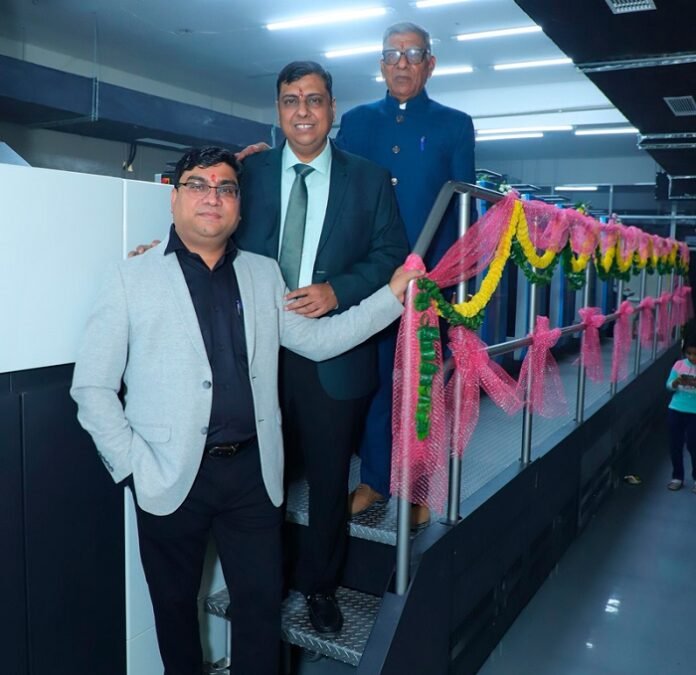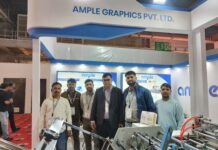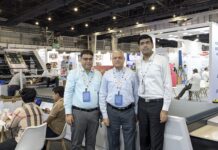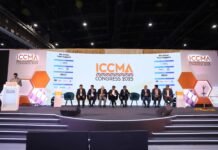
Adway Print Concept, a key packaging printing provider, has rapidly expanded since its 2017 launch in Delhi. With a relocation to a 40,000 square feet Noida facility and the installation of a Komori GL-637C IR 6-color plus coater UV press in November 2024, the company strengthens its growth trajectory and broadens its technology base under the leadership of brothers Anuj Kumar Jain and Pradeep Kumar Jain. Its equipment upgrades support higher quality, efficiency, and capacity in serving the pharma, cosmetics, and electronics packaging markets.
Director Anuj Kumar Jain says that the new Komori GL-637C press contains three interdeck UV lamps, two UV lamps at the coater, and an end-of-press IR dryer. The multicolor UV press has enabled the company to enhance print with UV drip-off coatings for textures, along with the use of metalized polyester laminated (met-pet) board.
The new press has increased clients, topline growth, and work from earlier customers. “Apart from being easy on the pocket in an increasingly competitive packaging print environment, the new press ensures quality production and comes with the reliable Komori after-sales service,” Jain noted, adding that the ease of finding skilled operators and the company’s previous pleasant experience with Komori machines also featured in the purchasing decision checklist. “It is difficult to survive with expensive machines in today’s competitive landscape,” he says.
Adway’s production comprises 60-70 % of monocartons, rigid and luxury boxes 10%, and mastercartons 10%. Labels and pharma inserts each contribute 4-5%. While a major chunk of its work comes mainly from the pharma industry (70%), cosmetics, personal care, and electronics industries contribute to the remaining 30%.
The company’s customers are mainly in Northern and Western India, with Delhi-NCR, Uttar Pradesh, Uttarakhand, Himachal Pradesh, and Gujarat contributing the maximum, and a bit coming from Hyderabad in the South. Monocarton exports to Bahrain and the Gulf countries contribute 4-5% to that segment.
Apart from the two Komori presses, Adway’s extensive ancillary and converting equipment includes a Stahl (6+6) folder from Heidelberg for processing pharma inserts, a Bobst VisionFold folder gluer, a China-made MK automatic die-cutter, a KDK automatic laminator, a Kongsberg sample-maker, and semi-automatic taping, glueing, box-making, and bubble pressing machines from Zhongke and Ample Graphics. Jain praises the Bobst and Zhongke machines for their advanced features and commendable after-sales service.
With its fleet of sophisticated equipment, Adway produces four crore (40 million) monocartons along with one crore (10 million) pharma inserts each month. Rigid boxes and master cartons each amount to 5 lakh pieces (500,000) per month. The Jains use paper and board from Indian mills such as Khanna Paper Mills, Dev Priya Paper, ITC, JK Paper, and Century Pulp and Paper, and inks from the Indian plants of DIC and Siegwerk, for consistency and quality in the printing and converting operations. They avoid the supply chain and availability issues of imported supplies. Adway uses 285 resources, including 100 skilled workers and 125 contractual labor, and 60 senior and managerial staff. Having built a reputation for quality across the packaging landscape over the last eight years, the company uses its four trucks for the timely delivery of finished goods. According to Jain, relocation to Noida was a wise move due to the additional space, lower electricity costs and statutory minimum wages, along with a number of government subsidies.
When asked about the main challenges, Jain says that while printing rates have remained flat over the last two decades, there has been a five-fold increase in labor costs coupled with significant increases in raw material, chemicals, electricity, and transportation costs, resulting in a continuous reduction of profit margins for printers. Newer entrants often offer cheaper printing services to establish themselves in the industry, which adds to hyper-competition. The printing industry needs to decide on standard printing rates for the benefit of all, he added.
“Though there is good growth in monocartons, the packaging industry is capital-intensive. The government should give due importance to the packaging industry, else it will be left behind,” Jain says. Premium packaging, velvet or soft-touch UV coatings, textures, and cold-foil applications and embellishments are among the current trends, he says, adding that though digital packaging is the future of the industry, it hasn’t made much impact in India as of now.
The Jain brothers plan to enter the liner carton segment for ghee, masalas, and tea by the end of this year and have booked a Heiber Schroeder WP Speedliner rotary window patching and carton lining machine for this expansion. Jain cited the volume demand and relatively less competition as the driving factors for the upcoming move.
Adway participated in the recent PackPlus exhibition in Delhi’s Pragati Maidan, receiving an overwhelming response. “Apart from the addition of new clients, we have also gathered several quality leads for subsequent business expansion,” Jain said, while adding that the company is preparing to participate in the upcoming Bharat Pack Expo from 28-30 November in Jaipur.










